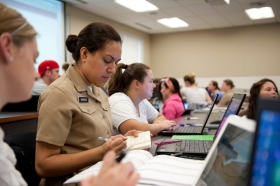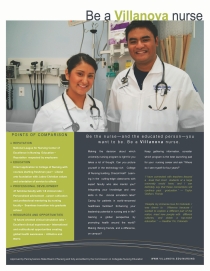As a nursing major, you participate in a challenging four-year academic program of high quality that includes laboratory and clinical experiences under qualified faculty guidance. There are also other study opportunities available to you such as learning communities, study abroad, minors, and ROTC options.
Traditional Four Year Curriculum

During your first two years in the nursing curriculum, you take a combination of liberal arts and science courses, as well as courses in basic nursing theory and clinical skills. Much of this experience occurs in the Fitzpatrick College of Nursing Learning Resource Center (LRC). The LRC houses audio-visual materials, training models and simulations to support the educational program. At the end of the sophomore year and throughout the junior and senior years, you enroll in nursing theory courses and clinical courses that provide experience in a wide variety of health care facilities.
The 133-credit curriculum is outlined below.
First Year
| Code | Course | Credits |
|---|---|---|
| NUR 1102 | Introduction to Professional Nursing |
2 credits |
| ACS 1000 | Augustine Cultural Seminar Ancients |
3 credits |
| BIO 1205 | Human Anatomy & Physiology I | 4 credits |
| PSY 1000 | General Psychology | 3 credits |
| CHM 1135 | General, Organic & Bio Chemistry | 4 credits |
| CHM 1105 | General, Organic & Bio Chemistry Lab | 1 credits |
| 17 credits |
||
| NUR 1104 | Introduction to Professional Nursing Practice |
2 credits |
| ACS 1001 | Augustine Cultural Seminar Moderns |
3 credits |
| BIO 1206 | Human Anatomy & Physiology II | 4 credits |
| NUR 1105 | Social Justice and Health Equity | 3 credits |
| ENG 1050 | The Literary Experience | 3 credits |
| THL 1000 | Faith, Reason and Culture | 3 credits |
| 18 credits |
Sophomore Year
| Code | Course | Credits |
|---|---|---|
| NUR 2204 | Health Assessment | 2 credits |
| NUR 2205 | Practicum in Health Assessment | 1 credits |
| BIO 1181 | Microbiology and Genetics | 4 credits |
| PSY 3200 | Human Development | 3 credits |
| -- | NTR 2120 or STAT 1250 | 3 credits |
| ELECTIVE | Social Studies Elective | 3 credits |
| 16 credits |
||
| NUR 2206 | Essentials of Nursing Practice |
2 credits |
| NUR 2208 | Practicum in Essen of Nsg Prac | 3 credits |
| NUR 2108 | Human Pathophysiology | 3 credits |
| SOC 1000 | Intro to Socioligy | 3 credits |
| PHI 1000 | Knowledge, Reality, Self | 3 credits |
| -- | NTR 2120 or STAT 1250 | 3 credits |
| 17 credits |
Junior Year
| Code | Course | Credits |
|---|---|---|
| NUR 3104 | Nsg Adults & Older Adults l | 5 credits |
| NUR 3105 | Psychiatric & Mental Hlth Nsg | 5 credits |
| NUR 3031 | Basic Concepts in Pharmacology | 3 credits |
| NUR 3810 | Research & Schol in Nsg Pract | 3 credits |
| 16 credits | ||
| NUR 3106 | Nsg Care Adul & Older Adul ll | 5 credits |
| NUR 3107 | Nsg Care of Women & Families | 5 credits |
| NUR 3131 | Applied Pharm in Nsg Prac | 2 credits |
| NUR 3122 | Imper for Global & Pub Health | 3 credits |
| PHI 2115 | Ethics for Health Care Prof | 3 credits |
| 18 credits |
Senior Year
| Code | Course | Credits |
|---|---|---|
| NUR 4111 | Nsg Adults w Comp Hlth Prob | 5 credits |
| NUR 4115 | Nursing Care of Child & Adul | 5 credits |
| NUR 4119 | Nsg Leadership & Health Policy | 3 credits |
| NUR 4031 | Safe & Effect Pharm & Par Ther | 2 credits |
| 15 credits | ||
| NUR 4120 | Community & Population Health | 7 credits |
| NUR 4121 | Knowledge Integ Pro Nsg Pract | 2 credits |
| NUR 4122 | Trans to Prof Nsg Practice | 3 credits |
| NUR 4200 | Seminars in Selected Topics | 1 credits |
| ELECTIVE | Upper Level Theology Elective | 3 credits |
| 16 credits |
TOTAL CREDITS: 133
* Students are required to select three elective courses: one upper level theology (in addition to THL 1000), one Social Studies (history, political science or economics).
Distance Education Disclosure
Click here for important information regarding the University's authorization status, students' responsibilities related to relocation and programs leading to professional licensures, and the complaint process for online students.



